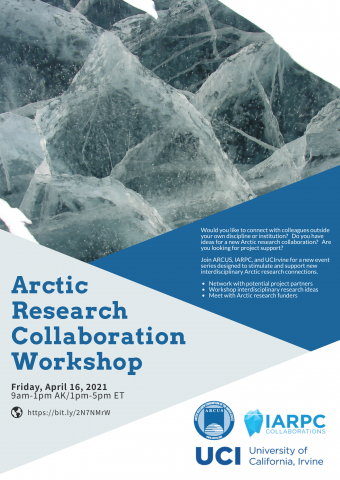
Format
In the first half of the workshop, participants will hear from a panel of experienced inter-/transdisciplinary researchers as they share examples of successful collaborative research projects and reflect on the processes that support project conceptualization, disciplinary integration, and effective engagements with local communities. In the second half of the workshop, participants will break into small groups for a hands-on “collaboration sprint” exercise designed to help project teams identify and define specific research problems that might be used to stimulate ongoing research collaboration.
Cost
There is no cost to participate.
How to Join
The application period for the workshop is now closed. Both individuals and teams were invited to apply by Wednesday, 17 March 2021.
More About the Arctic Research Collaboration Event Series
This event is a follow-up to a 2-day workshop that took place at UC Irvine in fall 2019 and is Part 2 of a 3-part event series that UCI, ARCUS, and IARPC have organized to support transdisciplinary team development for Arctic research collaboration. Part 1 of the series was an Arctic Researcher Speed Networking event that took place on 5 February 2021 to help facilitate introductions and connections across disciplines. Part 3 of the series will be an Arctic Research Funders Meet & Greet event taking place on Friday, 7 May 2021 to help researchers learn more about current Arctic research funding opportunities and connect them with funding agency program officers.
For more information about either the workshop or Arctic Research Collaboration event series, please contact Brit Myers at brit [at] arcus.org.
 National Science Foundation support for this workshop has been provided in part under Grant No. NSF-SES 1935653 and Cooperative Agreement No. PLR-1928794.
National Science Foundation support for this workshop has been provided in part under Grant No. NSF-SES 1935653 and Cooperative Agreement No. PLR-1928794.
Presentations
Participant Presentations
The presentation files below were shared during the workshop's small group breakout session. Workshop participants were invited to briefly outline one issue, problem, &/or research question that they would be interested in exploring with a team of interdisciplinary collaborators and to outline 2-3 concepts that they felt were important for others to know about the issue based on their own discipline, perspective, or experience.
